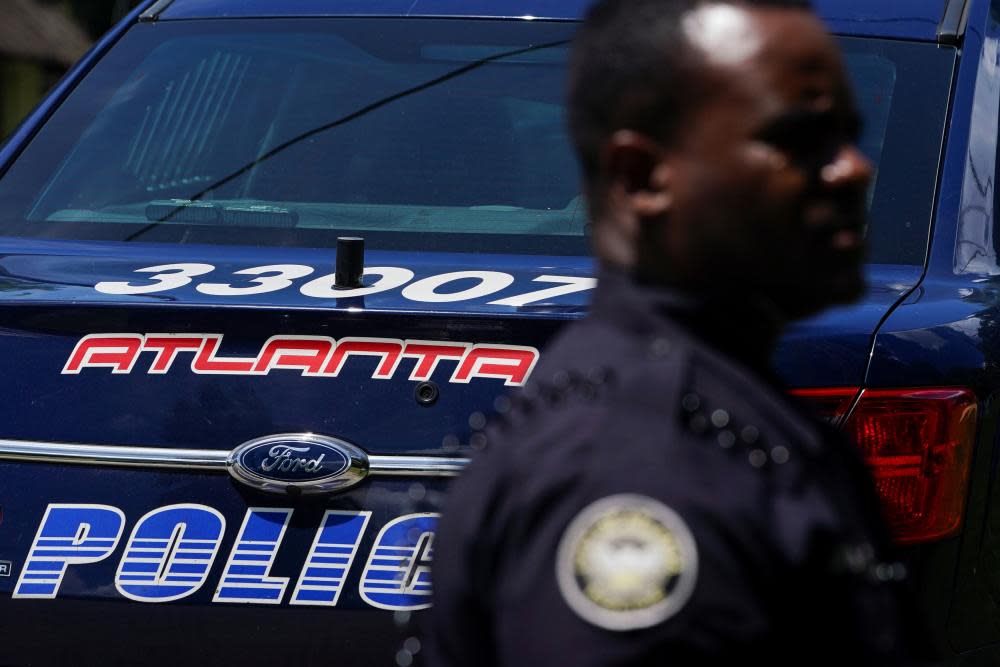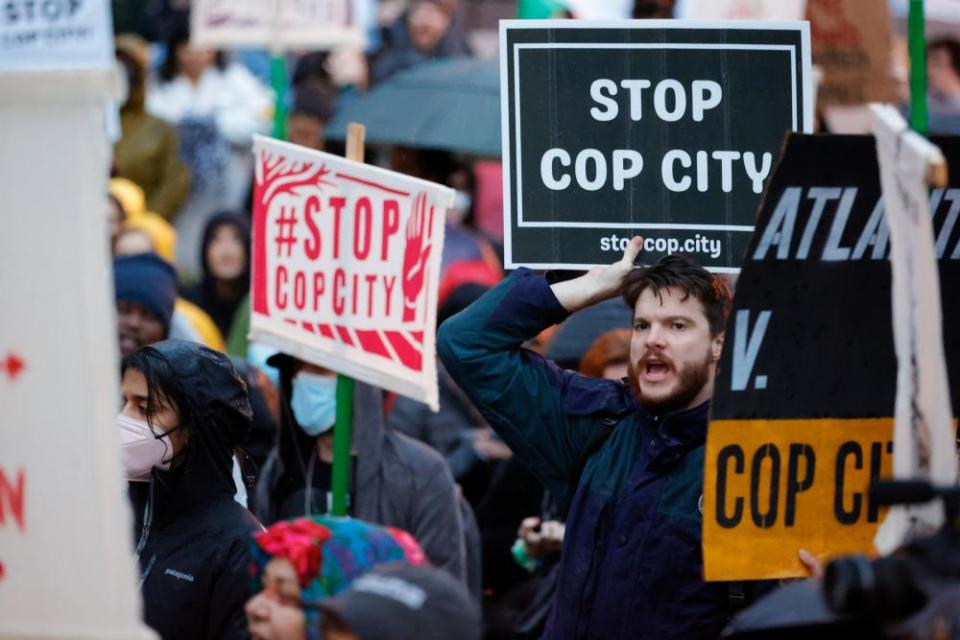Investment fund links to Atlanta police and ‘Cop City’ project revealed

A new investigation has uncovered connections between private equity firms and the contentious development of a sprawling police and fire service training complex in Atlanta known as “Cop City” and the police force which fatally shot an environmental activist.
Private equity refers to an opaque form of financing away from public markets in which funds and investors manage money for wealthy individuals and institutional investors such as university endowments and state employee pension funds.
Related: ‘We deserve to know’: autopsy of ‘Cop City’ activist shot by police incomplete two months on
Research shared exclusively with the Guardian details links between Roark Capital, an Atlanta-based private equity firm which owns the country’s second-largest restaurant company, Inspire Brands, and a corporate backer of the Atlanta police foundation (APF).
Paul Brown, the CEO of Inspire Brands, whose portfolio includes fast food franchises Dunkin’, Baskin Robbins and Arby’s, sits on the board of trustees of the APF, which is raising $60m from corporate funders to build Cop City in the Atlanta forest previously earmarked for a public park.
Police foundations are nonprofits which raise private money from individual and corporate donors that is funnelled to police departments with little oversight or accountability. The APF has previously helped Atlanta police fund recruitment drives, surveillance cameras and Swat team equipment.
The police crackdown on community protests against Cop City have led to dozens of charges of domestic terrorism and the police killing of the environmental activist Manuel Paez Terán, known as “Tortuguita”. Police said Paez Terán shot at them first, but have not produced any body cam or other video footage of the shooting.
The APF has helped Atlanta become the most surveilled city in the US in large part thanks to a program called Operation Shield.
Silicon Valley firm Silver Lake Management, one of the world’s largest tech-focused private equity firms, has invested more than $1bn in Motorola Solutions, which designed and implemented the surveillance system for Operation Shield, according to a new report by the Private Equity Stakeholder Project (PESP).
Motorola has been criticised for providing high-tech surveillance equipment used in US prisons, on the US-Mexico border and in the West Bank. Several European pension funds have divested from Motorola, and it was included in a UN list of companies “that had raised particular human rights concerns” by providing surveillance tools and other services to the Israeli government.

Operation Shield currently boasts more than 12,800 private and public interconnected cameras monitored by the police – the highest number per capita in the country. Motorola has sold more than $22m worth of products and services to the Atlanta police department since 2016.
Silver Lake Management has invested money from pension funds paid into by Texas and Ohio teachers and South Dakota and California state employees, according to PitchBook.
In 2022, Silver Lake added Shadowbox Studios (formerly Blackhall Studios), a television and film studio company, to its portfolio with a $500m investment. The studios are located south of the Cop City site.
At an APF meeting on the Cop City budget in February, the agenda included what appeared to be a discussion on a possible future relationship between Shadowbox and the APF. The meeting agenda included the following item: “Are there any scenarios where we can come up with some agreement to work with Shadowbox for them to help fund some components and in return they have access to use the facility for filming purposes?”
There is no evidence that Shadowbox had any knowledge of the agenda item or that it has contributed in any way to the APF.
“We’ve shown that private equity does have its hands in the controversy that is unfolding around Atlanta and its police force. Knowing the relationships Roark Capital and Silver Lake Management have with Cop City, [the Atlanta police department] and APF will give activists another tool to demand accountability for the recent violence and the destruction of the Georgia environment,” said Amanda Mendoza, PESP researcher and coauthor of the report.
The private equity industry manages about $11tn globally. Asset managers and funds buy and restructure companies including startups, franchises, troubled businesses and real estate operations using their clients’ money. Yet unlike banks and other publicly listed companies, private equity firms are exempt from most financial disclosure rules, making it extremely difficult to track their assets – or risks.
It means people such as firefighters, nurses and teachers whose pensions are invested in private equity funds have little way of knowing if their retirement nest egg is financing police surveillance equipment, defence contractors, hospitals or coal plants.
The report Private Equity Profits from Destroying the Atlanta Forest is the latest attempt by researchers to uncloak the industry’s activity.
Roark Capital mostly invests in franchises like fast food chains and in February 2023 claimed $33bn in assets under management. The company has lobbied against a federal minimum wage, and a 2020 report by the Government Accountability Office found employees at some Roark brands were among the most frequent recipients of food stamps in some states.
After protests swept across the US in response to the 2020 police killing of George Floyd, Inspire Brands CEO and APF board member Paul Brown posted a letter on LinkedIn calling attention to “violence” and “attacks” by protestors – without mentioning the police violence that triggered the protests. (Roark’s own CEO donated thousands of dollars to former Georgia senator David Perdue as he promoted the big lie and sought to overturn the 2020 presidential election.)
Another Roark connection is Marshall Freeman, who for seven years served as chief operating officer of the APF and sits on the board of the Inspire Brands Foundation, the company’s philanthropic arm. Freeman has joined the Atlanta police department as a deputy chief administrative officer.
The enormous amounts of money at the disposal of private equity often comes from state employees and retirees
Charles Mahoney of California State University
Roark has invested money from several public worker pensions funds, including those of firefighters and police in Colorado, Los Angeles city employees, Oregon and New York state workers, and Louisiana teachers, according to PitchBook.
“The enormous amounts of money at the disposal of private equity often comes from state employees and retirees, who would be very surprised to learn where their investments are going. That’s why it’s important to follow the money, ” said Charles Mahoney, associate professor of political science at California State University who researches private equity investments in defence and national security.
Roark Capital did not respond to multiple requests for comment. Silver Lake declined to comment.
Atlanta is the US’s 38th most populous city, according to the 2020 census. The APF, a nonprofit whose corporate backers also include UPS, Home Depot, Wells Fargo and Coca Cola, is the second-largest police foundation in the country after New York City.
According to LittleSis, a corporate finance watchdog group, “police foundations act as a backchannel for corporate and wealthy interests by funding policing even further, adding to already overinflated budgets without any required public oversight, approval, or accountability.”
The Atlanta police department was allotted a third of the city’s $700m budget in 2022, and has received additional money through the APF to expand its surveillance capacity and recruit more officers.
Less than a week after Atlanta police shot and killed Rayshard Brooks in the summer of 2020, the APF gave every officer in the city a $500 bonus.
The APF received a record $11.7m in donations in 2021, a figure likely to rise since Georgia passed new legislation expanding personal tax breaks last year. In addition to funding the police directly, the city has also given the APF more than $3.6m since 2016 for Swat team equipment, licence plate readers and thousands of cameras for Operation Shield.
Mendoza said: “When it comes to policing, which already faces severe accountability and transparency issues, private equity involvement adds an additional layer of opaqueness. This report is just scratching the surface in investigating how private equity has contributed to not only moving these dangerous projects forward but also supporting a devolving situation of violence in the city.”
Paez Terán was part of a broad social movement that opposes the $90m Cop City training complex planned for 85 acres of the South River forest, one of Atlanta’s largest remaining green spaces. The social movement also opposes plans to develop 40 acres of public park in the same forest.
Paez Terán’s death was the first known killing by police of an environmental activist in the US. The police crackdown has continued since his death amid growing local opposition to Cop City. Community concerns include increasing police militarization and excessive force especially against Black residents, as well as losing part of a forest that had been included in 2017 plans to create what would have been the city’s largest park.

 Yahoo News
Yahoo News 
